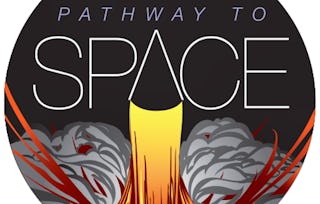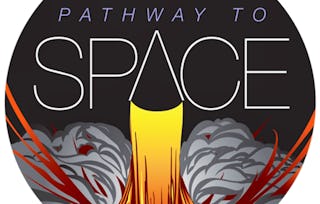The spirit of NewSpace is revolutionizing our vision of access to space. Reading keys will enable you to understand the technological and strategic challenges in games with new rules, fixed by ambitious players. Combine the new technologies and management of space access with the classical paradigm of the existing space context.

New Space: Access to space - Basics

56 reviews
Recommended experience
What you'll learn
Understand how to access space.
Acquire basics on launchers architecture and propulsion system.
Understand what characterize launchers and rocket engines developed in the New Space.
Skills you'll gain
- Emerging Technologies
- Mechanical Engineering
- Environmental Issue
- Manufacturing Processes
- Physics
- Chemistry
- New Product Development
- Innovation
- Engineering
- Thermal Management
- Sustainable Engineering
- Skills section collapsed. Showing 10 of 11 skills.
Details to know

Add to your LinkedIn profile
4 assignments
See how employees at top companies are mastering in-demand skills

There are 5 modules in this course
What's included
1 video
The NewSpace is a wide concept that emerged more than ten years. It is difficult to define, but it is relatively feasible to explore the consequences of NewSpace on orbital transportation. The access to space, that’s the major point. In this field, a real revolution has taken place. It is the result of several factors, which are actually the maturity of what was developed in the "traditional space" (or classical) that still has its full place today. The balances have been modified, and this Mooc presents precisely - for access to space - the main issues, openings, technologies, and perspectives that are offered to us.
What's included
8 videos1 reading1 assignment
The propulsion system is the most important subsystem of any launch vehicle: it provides the thrust and Isp needed to complete the mission. The objective of this week is to provide you with an introduction to the rocket engines used in launch vehicles for space access. You will understand the fundamentals of propulsion systems, and you will understand how to relate the propulsion system to the launch vehicle mission analysis. This will allow you to understand, next week, how disruptive technologies and innovative methodologies in the new space affect the future generation of rocket engines. The week starts with an introduction to how rocket engines work, some orders of magnitude of power, and an introduction to fundamental performance parameters. Then the different types of rocket engines will be presented: liquid, solid, and hybrid. The week will end with a focus on liquid propellant engine technologies: subsystems and cycles.
What's included
16 videos1 assignment
In this week you will be able to understand what are the main aspects that characterize access to space in the new space. Using the knowledge you gained in week 1 on mission analysis and week 2 on propulsion systems, you will be able to understand how the design, production, and use of launchers and rockets are affected by the New Space. During this week, we will give you an overview of the production methodologies and the main disruptive technologies that characterize New Space rockets and launchers. Finally, we will discuss sustainable space, highlighting both the issues raised by New Space and the actions that could be taken.
What's included
7 videos1 assignment
In this final graded assessment, you will check your knowledge and apply it.
What's included
1 assignment
Instructors


Offered by
Explore more from Physics and Astronomy
 Status: Free Trial
Status: Free TrialUniversity of Colorado Boulder
 Status: Free Trial
Status: Free TrialUniversity of Colorado Boulder
 Status: Free Trial
Status: Free TrialUniversity of Colorado Boulder
 Status: Free Trial
Status: Free TrialUniversity of Colorado Boulder
Why people choose Coursera for their career

Felipe M.

Jennifer J.

Larry W.

Chaitanya A.
Learner reviews
- 5 stars
71.42%
- 4 stars
21.42%
- 3 stars
5.35%
- 2 stars
0%
- 1 star
1.78%
Showing 3 of 56
Reviewed on Mar 23, 2023
Can you add math exercise after each lecture (before taking quizzes) that will hone student's understanding ? Appreciate !
Reviewed on Jan 30, 2024
It was intriguing to learn about rockets in a way I never thought I would learn. It was super-challenging to learn the intimate details of rocket propulsion math, but satisfying.

Open new doors with Coursera Plus
Unlimited access to 10,000+ world-class courses, hands-on projects, and job-ready certificate programs - all included in your subscription
Advance your career with an online degree
Earn a degree from world-class universities - 100% online
Join over 3,400 global companies that choose Coursera for Business
Upskill your employees to excel in the digital economy
Frequently asked questions
To access the course materials, assignments and to earn a Certificate, you will need to purchase the Certificate experience when you enroll in a course. You can try a Free Trial instead, or apply for Financial Aid. The course may offer 'Full Course, No Certificate' instead. This option lets you see all course materials, submit required assessments, and get a final grade. This also means that you will not be able to purchase a Certificate experience.
When you purchase a Certificate you get access to all course materials, including graded assignments. Upon completing the course, your electronic Certificate will be added to your Accomplishments page - from there, you can print your Certificate or add it to your LinkedIn profile.
Yes. In select learning programs, you can apply for financial aid or a scholarship if you can’t afford the enrollment fee. If fin aid or scholarship is available for your learning program selection, you’ll find a link to apply on the description page.
More questions
Financial aid available,

